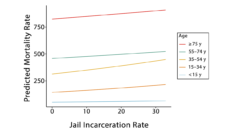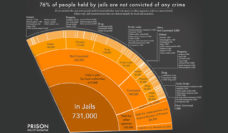Prisoners are one of the only populations with a constitutionally protected right to healthcare. A 1976 supreme court case recognized inadequate care while incarcerated as cruel and unusual punishment. Any failure to provide sufficient care to prisoners is, therefore, a violation of human rights. As the number of incarcerated women grows exponentially faster than the number of incarcerated men, so does the disparity in care between sexes.
Women’s prisons were adapted from men’s facilities, with little thought to women’s vastly different health needs. They are not set up to provide access to menstrual products, cervical and breast cancer screenings, or reproductive, prenatal, and menopause care. In 2018, the Department of Justice Inspector General admitted that prison policies “may not fully consider the needs of female prisoners.”
The US Commission on Civil Rights recently published a report reviewing women’s rights while in prison. The report revealed that female prisoners are receiving inadequate care at a greater frequency than male prisoners.
Reproductive health
Incarcerated women are being delayed or denied prenatal care exams and ultrasounds. Incidents have been reported of women being forced to wait months for time-sensitive prenatal emergencies, resulting in miscarriages that were likely preventable. Many are forced to deliver in unsafe conditions, including giving birth alone in cells.
Pregnant women are still being shackled while transported for care and during labor and delivery. Shackling increases medical risks for both mothers and infants. The restraints can cause bruising, bleeding, and increase the risk of falls, which can lead to placental separation, hemorrhage, miscarriage, and stillbirth. Despite a federal ban, only 26 states have outlawed the practice of shackling pregnant prisoners.
State prisons failing to meet the health needs of women despite constitutional protection is a violation of human rights.
Menstrual health
Federal legislation entitles female prisoners to free and accessible menstrual products. But only Colorado, Connecticut, Kentucky, Maryland, and Virginia have passed legislation ensuring such access.
Prisoners in every other state face the cost of purchasing their own products on already limited budgets. Some have trouble accessing menstrual products even when they can afford them, increasing their risk of infection from having to use unclean alternatives for menstrual hygiene. An investigation by the Equal Justice Initiative at Tutwiler women’s prison in Alabama reported incidents of female prisoners performing sex acts on prison staff in exchange for menstrual hygiene products.
Mental health
In 1993, a federal court in Arizona found that prisons provided fewer mental health resources for women compared to men. Further investigation found evidence of “deliberate indifference to women’s mental health needs.”
The 2019 US Commission report found that incarcerated women experience higher rates of past trauma and sexual assault than male prisoners, resulting in greater need for mental health services. They are also at higher risk for verbal and sexual assault while incarcerated. Yet, mentally ill female prisoners are often punished, whereas male prisoners are more likely to be sent for treatment.
Federal legislation means little for state regulation
Recent legislative reforms, such as the First Step Act of 2018 and the Dignity of Incarcerated Women Act, bolster female prisoner’s rights to healthcare. However, both acts were passed at the federal level, and no agency or organization is currently responsible for enforcing federal standards in state prisons, where 88 percent of female prisoners are incarcerated.
State prisons failing to meet the health needs of women despite constitutional protection is a violation of human rights. According to the US Commission on Civil Rights, state and federal agencies need to work together to uphold federal standards in state prisons and close the gender gap in prisoners’ health.
Photo via Getty Images














